The book in 3 sentences
Peter Block challenges the dominant “business perspective”, built on scarcity, consumption, and institutional control, and offers a new story: the common good perspective, where citizens reclaim agency through trust, local action, and relational care. He argues that real change happens when neighbours gather, share power, and co-create community well-being, rather than waiting for systems to fix things. In short, we are not the bottom; we are the point, and change begins through small, relational acts of citizenship, day in, day out.
Who should read it
- Anyone feeling disillusioned by political or institutional dysfunction
- People eager to build connections and agency in their local communities
- Citizens who want practical, conversational-based action rather than grand reform
- Those who believe small-scale trust-building can spark broader transformation
Top 3 quotes
“We are not the bottom. We are the point.” – This powerful declaration reframes citizenship: we aren’t passive recipients, but essential agents of change
“The common good begins the moment we collectively believe in it.” – This captures the essence of Peter Block’s argument, that belief and intention are the seeds of collective transformation
“The core challenge is to transform the isolation and self‑interest within our communities into connectedness and caring for the whole.” – Transformation is less about fixing problems and more about restoring relationships and responsibility to one another
Key takeaways
Business versus common-good narratives. The business perspective prizes scale, speed, control, and consumption, often reducing citizens to clients or consumers of services. The common good perspective reframes people as creators of value and trust, focusing on relationships, contribution, and shared purpose.
Myth of division. The dominant cultural narrative suggests we are deeply polarised, but this is often overstated. Most people care about the same core things: safety, dignity, fairness, and a future for their families. When given space to talk as citizens, not factions, common ground emerges.
Institutions support but do not lead. Systems and institutions can provide structure or resources, but they are not the source of meaningful change. The source lies in local relationships. Institutions should follow and support the momentum that emerges from citizen-led action.
Relational activism. Rather than trying to persuade or inform people through campaigns or messaging, Peter Block advocates for convening people through conversation. When people are invited into a space where they feel heard and connected, they are more likely to take ownership of change.
Citizenship equals production. Citizenship is not simply about voting or following laws. It is about producing something of value with others. When people step into the mindset of co-creators, rather than consumers, the community becomes a place of agency and shared responsibility.
Power of the small. Large-scale programmes may bring resources, but transformation happens in small, local spaces. Cafés, kitchens, church halls, and neighbourhood libraries offer the intimacy and continuity that systems cannot. It is in these settings that trust is built and maintained.
Conversations over content. Information alone does not transform. What shifts people is connection and reflection. Meetings, workshops, and gatherings should be designed not to transmit content but to invite meaningful conversation. When we talk about what matters, we begin to act on it.
Belonging as a foundation. Without a sense of belonging, people withdraw or disengage. Belonging is not created through performance or productivity, but through being seen and welcomed. A community that builds belonging fosters commitment, creativity, and care.
Five things you could do this week
1) Host a “citizen conversation” with a small group of neighbours or friends and ask:
“What’s something you care about that you’ve been quiet about lately?” This invites personal reflection without pressure. It gently explores where someone may feel stuck, conflicted, or yearning for voice or action.
“What’s one small thing we could do together that would make a difference?” This shifts the focus from talk to possibility, grounded in shared agency, not grand plans. It plants the seed for connection, not obligation.
2) Map where trust already exists in your community or workplace. Take 20 minutes to identify people or spaces where trust is already present, a coffee ritual, a WhatsApp group, a shared bench. Then consider how to strengthen or expand that trust with a small action or invitation.
3) Create a “no agenda” gathering. Host a short meetup without a goal, topic, or outcome. The purpose is simply to be present with others in your community, not to fix anything. Peter Block argues that structured, transactional meetings often miss the human need for presence, connection, and story.
4) Reclaim a physical space for conversation. Choose a place that is familiar but underused , a park bench, a community garden, a back room at a café, and turn it into a place for connection. Use it to host informal discussions or simply show up and listen. In Peter Block’s framing, change begins when people reinhabit shared, relational space.
5) Ask someone new to host with you. Co-host a conversation with someone who holds a different identity, perspective, or generation. The act of inviting someone to help shape the space builds relational leadership and diffuses control — a core principle in Block’s common good perspective.
Connected readings
Stewardship explores leadership as service, not control. Activating the Common Good extends that choice to all citizens, not just those in charge.
Community examines belonging and accountability. This book shows how that sense of belonging can activate through trust and relational action and provides a conversation / convening structure.
The Answer to How Is Yes invites readers to focus less on technique and more on intention, purpose, and meaning. Activating the Common Good applies that mindset to citizenship, asking people to act from commitment, not certainty.
The Abundant Community (with John McKnight) celebrates the capacity of neighbours to produce health, safety, and connection without relying on systems. Activating the Common Good builds on that idea by naming the shift in mindset and conversation needed to make that capacity real.
All my curated Peter Block content is now available on the Peter Block Resources hub page.
My visual notes
Here are the sketchnotes I took as I read the book (in planes, trains and automobiles):
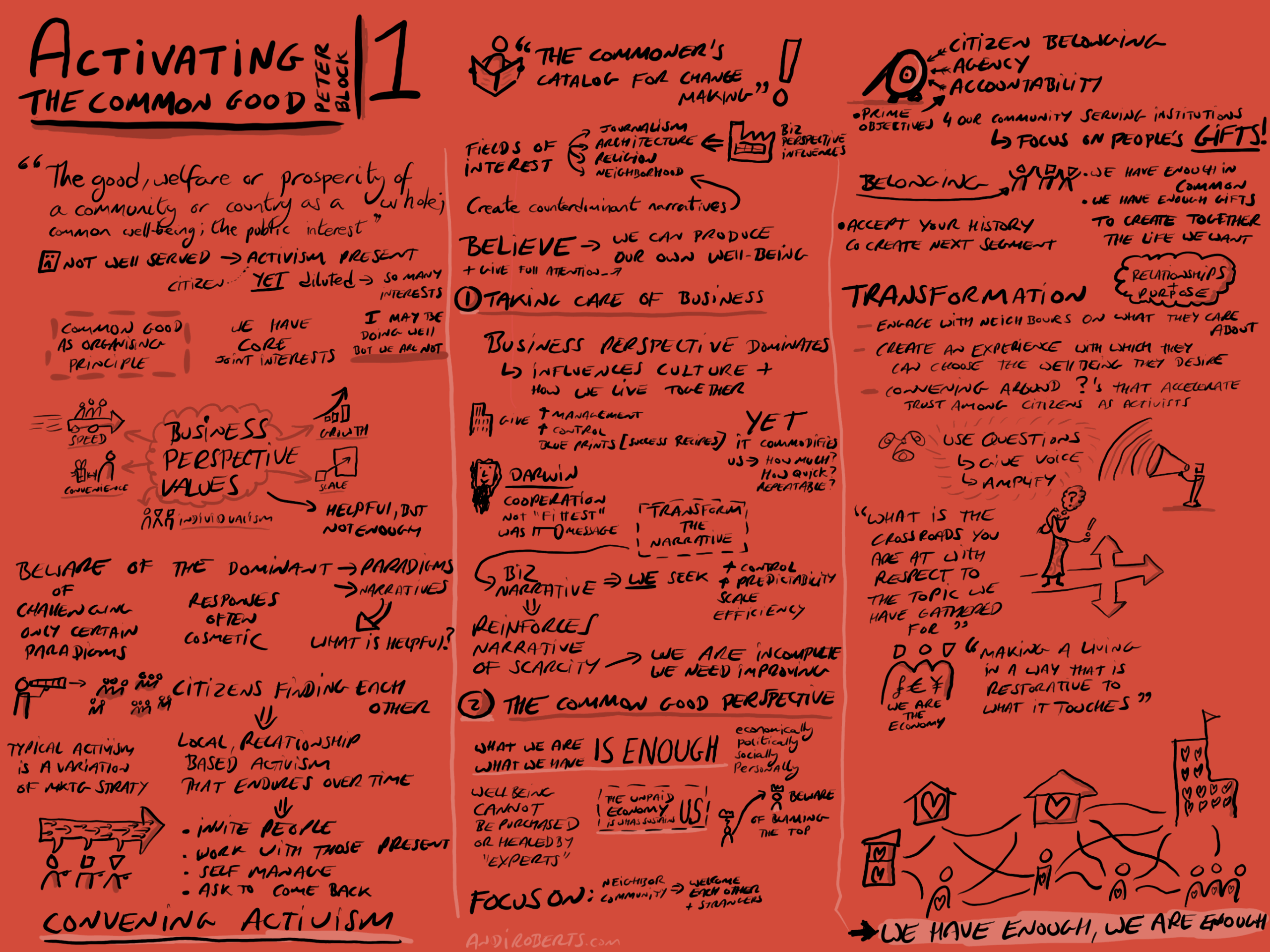






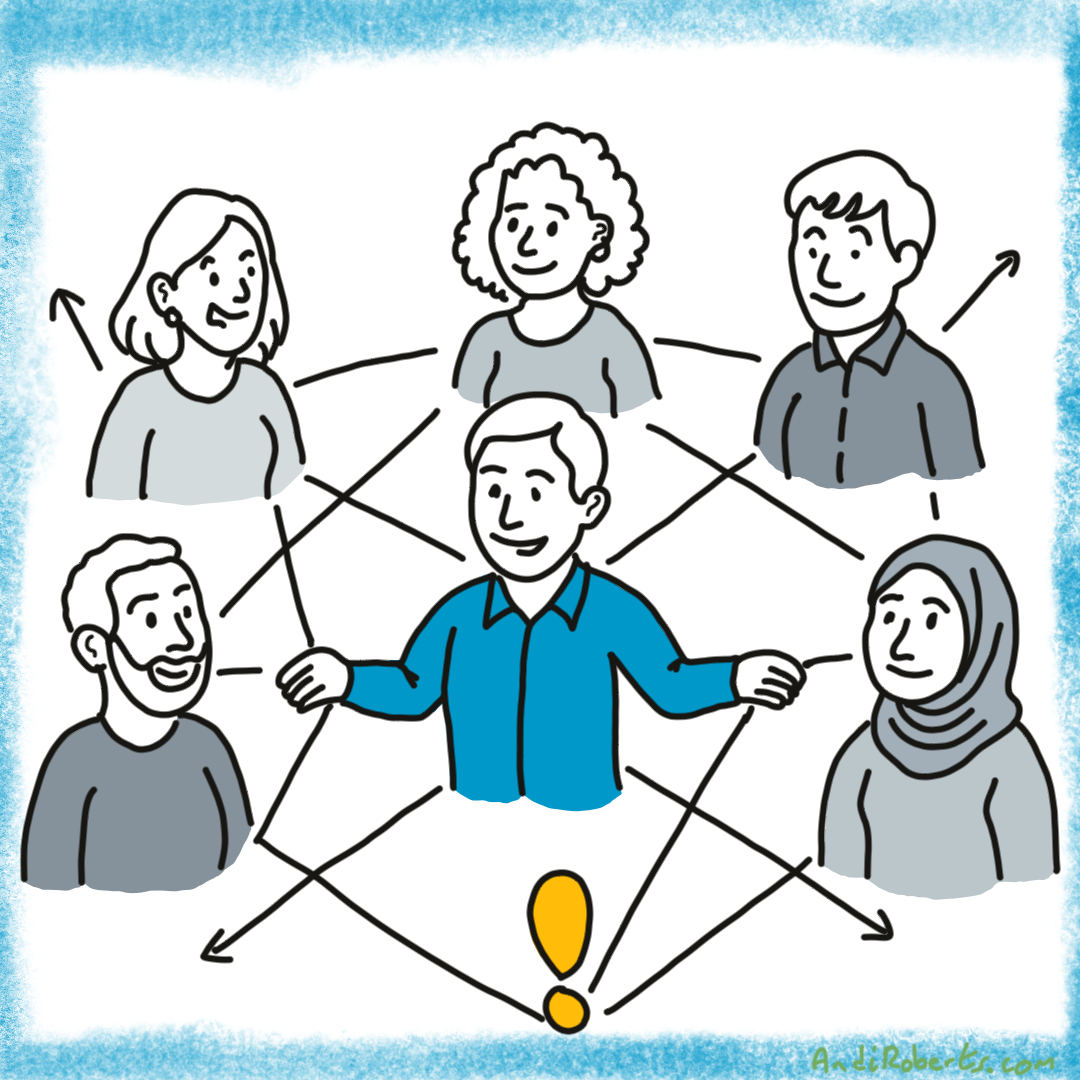
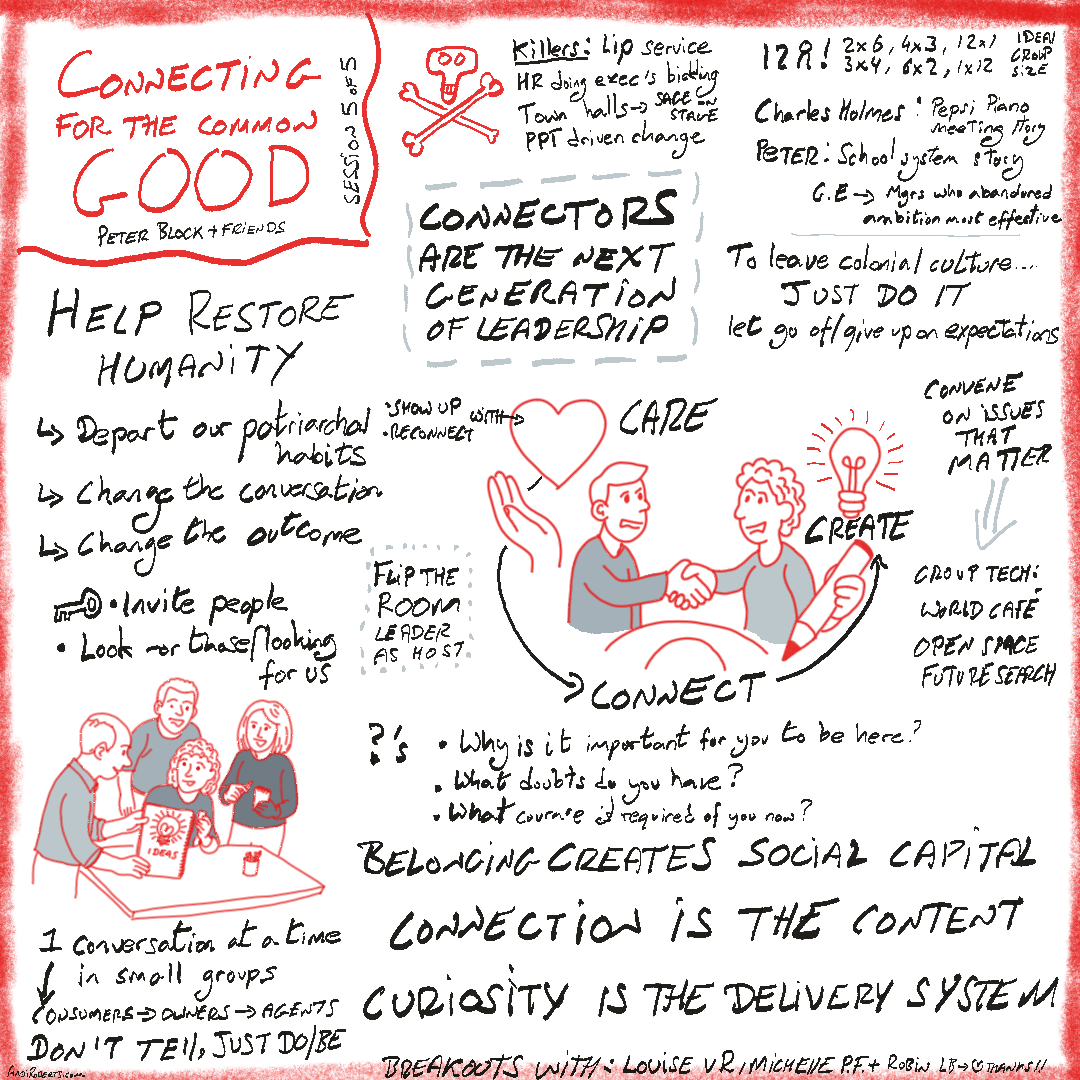
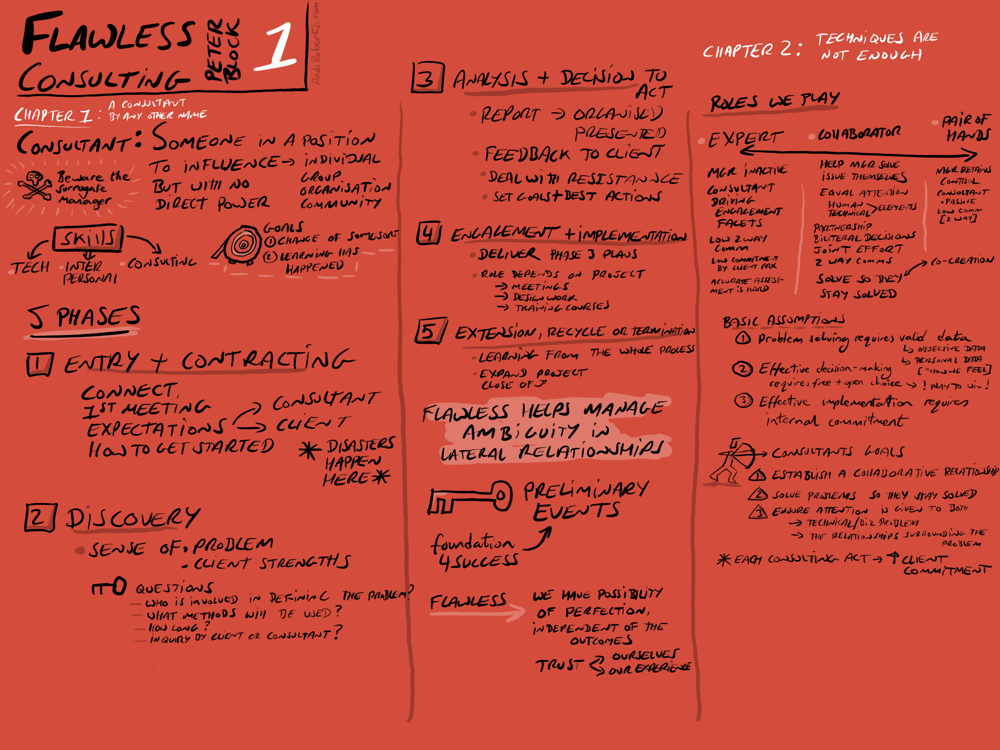
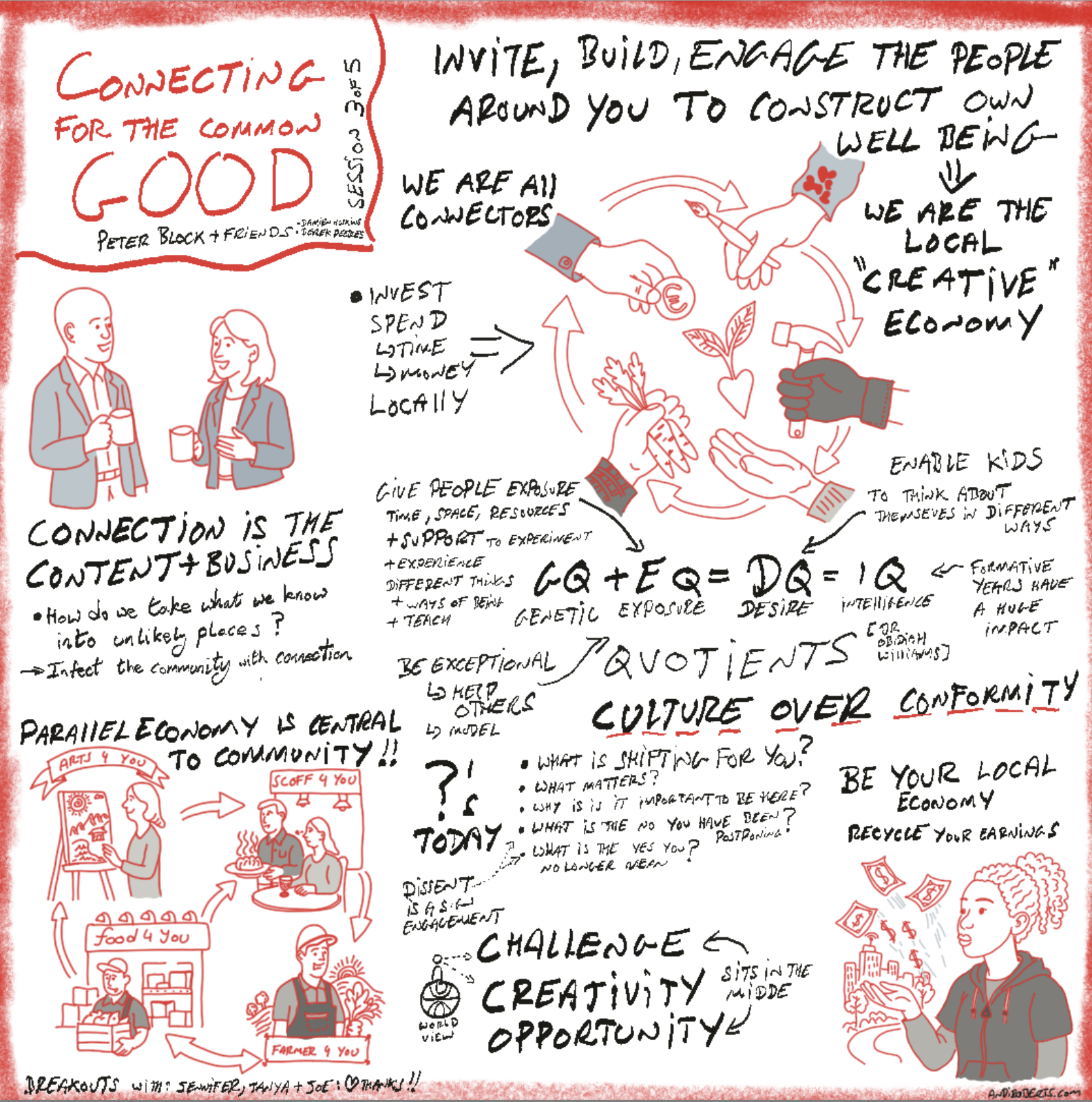
[…] Activating the common good: Where Stewardship addresses governance and power in organisations, Activating the Common Good expands the same principles into civic and neighbourhood life. Both argue for trust, local agency, and shared responsibility as the foundations for meaningful transformation. […]
[…] Activating the Common Good: Broadening the reach of empowerment into public life, this book shows how ordinary people create change through belief, conversation, and shared responsibility—mirroring many principles of empowered management. […]
[…] As always, my thinking here is heavily influenced by Peter Block and, in particular, his books Community and Activating the Common Good. […]
[…] Activating the common good: Where Stewardship addresses governance and power in organisations, Activating the Common Good expands the same principles into civic and neighbourhood life. Both argue for trust, local agency, and shared responsibility as the foundations for meaningful transformation. […]
[…] Activating the Common Good: This book takes the six conversations and relational practices from Community and scales them to civic life, neighbourhoods, journalism, architecture, and public institutions, showing how to rebuild trust and social capital across public domains. […]
[…] Activating the Common Good: Broadening the reach of empowerment into public life, this book shows how ordinary people create change through belief, conversation, and shared responsibility—mirroring many principles of empowered management. […]